This research study focused on the importance of employment in the lives of those living with disabilities and the barriers that businesses have when employing people with disabilities. We conducted two focus group meetings using Photovoice. The recordings of the meetings were transcribed, coded, and analyzed. After identifying themes and specific codes from these meetings, we summarized our findings into a handful of cohesive narratives based on the overarching themes below.
Table of Contents
Overview of Employment Experiences
Employment is essential for the individuals at Harc. For those employed, going to work every day makes them happy, and for those looking for jobs, coming to Harc every morning gives them hope. Employment is a means of financial independence for the individuals at Harc: the independence to see their family around the country, to learn to drive and to take their mothers to the movies. The participants actively seek jobs and do everything they can to hone their skills while leaving no stone unturned.
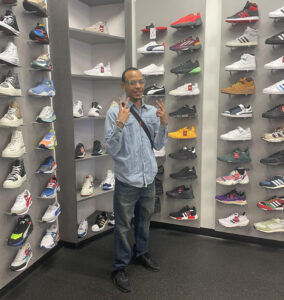
The participants expressed confidence in their skills and work experience for their past and present jobs. One participant, Mark, stated that he did not face difficulties because he knew how to do the job. When discussing barriers to employment, another participant, Jeff, acknowledged that it was challenging but expressed his positivity and determination to overcome obstacles. The participants report experiences with a friendly and positive workspace that allows them to thrive as social beings. One participant reported remaining friends with their coworkers even after years of they left the workplace. This experience with a social workspace is common among all participants.
Additionally, the participants constantly stress the meaning and importance of community and support in their professional as well as personal lives. Harc is a second home for them, it is a strong pillar of support for them in their journey of finding jobs. The community at Harc fosters community building, skill development, and a sense of belonging making it a wholesome society to be in.
On the flip side, a few participants recall times they had negative experiences in a formal work environment. One participant recalls the time he was falsely accused of stealing and let go because of the same. The majority of the participants and individuals at Harc were laid off because of COVID-19. The participants not only lost their community and support but also their financial independence with the pandemic.
Much like everyone else, the individuals at Harc wish to have jobs they are particularly passionate about. From working at a jewelry store to saving the day by becoming a firefighter. One day, the participants hope their passion translates to their profession.
Importance of Community
A crucial factor in the participants’ experiences with seeking and maintaining employment was the supportive communities they resided in. Participants discussed the various types of support they received, including emotional support, job coaching, and accommodations in the workplace.
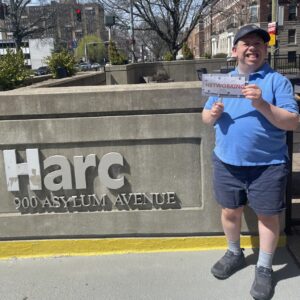
The quote, “Yes. [Harc] is a community. Yes, it is. And it [always] will be,” (Harc Focus Group 2, 00:46:29) reflects the deep sense of belonging that participants feel towards our partner organization. This quote emphasizes how important it is for individuals with disabilities to have a community that supports and understands their unique experiences. It also speaks to the importance of creating inclusive and supportive environments where people with disabilities can thrive.
Support from their employers was also crucial. In a diverse workplace, a focus on acceptance is essential for fostering independence, teamwork, responsibility, kindness, and realizing one’s full potential. To achieve this, promoting inclusivity and valuing each team member’s unique contributions is key.
One participant’s quote, “I just want to be helpful. That’s what I am,” (Harc Focus Group 2, 00:58:06) exemplifies another side of support within these spaces. For individuals with disabilities, navigating the job market can be daunting, and having support from those around them can make all the difference. This statement speaks to the desire of many people with disabilities to contribute meaningfully to their communities, in the same ways they have been helped; this is further explored in the jobs they are looking for.
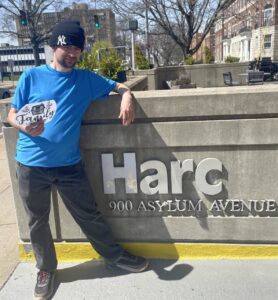
Their families also acted as a part of their larger community. Many cited family as a prime motivator for finding employment, leaning on them for support, and planning to use the money they made to support them. This is unsurprising, as parents of intellectually & developmentally disabled children are who founded Harc in the first place, showing how instrumental families are.
Having a social circle was also key to the happiness and achievement of our participants. Friends emerged as an integral factor in the participants’ experiences with seeking and maintaining employment, both at Harc & in their workplaces. The quote, “Yeah. We’re fast, efficient friends” (Harc Focus Group 2, 00:44:51) exemplifies the ease at which these individuals bonded with others, and how they prioritized them. At their jobs, coworkers often were befriended and the larger workplace functioned similarly; one participant discussed how the law firm she worked at for 25 years hosted parties that she enjoyed attending. Others kept in touch with work friends for 6 years after leaving their jobs, displaying that these connections were not just surface-level. Participants emphasized the importance of having friends who understand their unique experiences and can provide them with the support they need. For individuals with disabilities, navigating the job market can be daunting, and having a network of individuals who can offer encouragement and advice can make all the difference.
Importance of Employment
Employers must support their employees’ growth by offering training programs, mentorship, and career advancement opportunities. As you will see from our participants, creating an inclusive work culture that promotes a sense of belonging is a critical aspect of overall well-being and job satisfaction. Employers can make their workplace more accessible and accommodating by providing assistive technologies and an open-door policy to address concerns related to accessibility. By doing so, these individuals with disabilities can thrive and contribute their best work, maximizing productivity and morale.
Developing Skills for Independence
Developing skills is an integral component of building a strong community and creating financial independence, especially for employees with disabilities. Employers should provide opportunities for their employees to learn and grow, including training programs, mentorship, and career advancement opportunities.

Some expressed wanting to spend their money themselves: Olivia shared her passion for wearing and making jewelry and Jeff said he would use it for vacation. While others shared wanting to spend it on others: James said he would like to take his mother out to the movies, buy gifts for his mother and nephew, and also would like to save some in the bank. Others also talked about spending it for their own human capital growth: shelter and transportation. Mark expressed interest in using his money to get his own apartment when he is more independent and has a stable job/income. Sophia was especially excited about starting driving school. “That’s one of my goals, I’m working towards it” (Harc Focus Group 1, 10:42). With all these goals in mind, financial literacy, and budgeting are something that these individuals need assistance with. One of the parts of the employment process that Harc assists with is setting up a counseling service with benefits and teaching them about budgeting.
Because of this guidance, employees can enhance their skills and increase their value in the job market, ultimately leading to financial independence. Organizations like Harc can also offer specialized training and resources for employees with disabilities, helping them to develop their skills and achieve their career goals.
Sense of Belonging for Overall Well-Being
Feeling a sense of belonging in the workplace is crucial for overall well-being and job satisfaction, especially for employees with disabilities who may face additional barriers and challenges. An inclusive work culture promotes a supportive and understanding atmosphere that enables all employees to contribute their best work, maximizing productivity and morale.
To achieve this, it is essential to discuss ways to make the workplace more accessible and accommodating, including providing assistive technologies and creating an open-door policy to address concerns or suggestions related to accessibility. By doing so, everyone can feel valued and respected, and the community can continue to thrive.
Barriers of Employment
While individuals with disabilities boast about the importance of employment, they often face challenges along the way. They face barriers to accessing employment and during employment. This section highlights the findings of the barriers that people with disabilities face in employment like the COVID-19 pandemic, discrimination, and access to resources like financial literacy and transportation.
COVID-19 Pandemic
The COVID-19 pandemic is a large part of why many of the individuals that were once employed with the help of Harc, are no longer working. The combination of isolation, health problems, and an increase in remote working led to many people with disabilities being at a disadvantage for employment at these facilities.
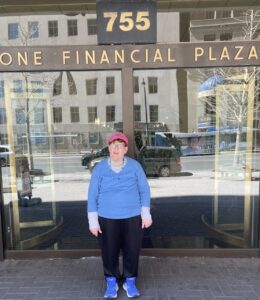
When we asked the participants why they were no longer employed, a popular answer was “It’s because of the pandemic or something” (Harc Meeting 2, 15:20) or “We got laid off because of COVID” (Harc Focus Group 2, 15:30)”. Not only were people being laid off from their jobs at the start of the pandemic, but those who weren’t laid off had the option of working remotely. One of the participants, Olivia, elaborated, “My friend says that a lot of people are working remotely” (Harc Focus Group 2, 17:39). An Assistant Director of Harc further explained why residents of Harc were negatively unfairly affected by COVID-19. She says “…so what [Olivia] was saying about what is kind of happening with their jobs, is that there’s a lot of remote work at these agencies, so it’s difficult to send them out where there’s no one in the building” (Harc Focus Group 2, 18:28).
A job that Olivia was employed with, along with William, laid them off after 25 years with the company because of the pandemic. Unemployment during COVID-19 is something that many of the participants experienced and related to. A trend that sticks out is this correlation: the job loss that people with disabilities experienced because of the pandemic and increased remote work because of the pandemic. This is a research question that we would like to explore in the future and how COVID-19 had an impact on jobs for people with disabilities is related to remote work and exclusionary practices.
Discrimination
Individuals with disabilities experience discrimination by society including lawmakers every day. This discrimination is amplified when the person with disabilities is also part of a minority group like LGBTQ+ or a person of color.
Mark, a man of color, recollected a time when he was told there were job openings at a fast food chain, but when he arrived, they told him there were no openings. The employees were whispering and very rude. He felt as though he was discriminated against because of his skin color and/or conditions. He was working the cash register, “a hard job that I didn’t know how to do” (Harc Focus Group 2, 54:29). The employer then fired him because they thought he stole something which he assured he would never do. Olivia also recalled an experience in the workplace with another employee where they were discriminated against because her coworker thought that said that she couldn’t do the job yet was successful for years.
An important part of this conversation that we held with us was when one of the participants, Jeff, talked about his experience with discrimination. “We face challenges every day. From when we wake up, to when we go home” (Harc Focus Group 2, 48:49). During our Photovoice code sharing, Jeff shared the phrase “being respected,” and also kept repeating, “I’m important” and that individuals with disabilities are important as well (Harc Focus Group 1, 54:35).
The assistant director stated “They find ways to do it without thinking they are doing it” (Harc Focus Group 2, 52:03). Despite these businesses claiming that they are disability friendly and accommodating, they still find loopholes to exclude people with disabilities from their employment. A spike in this came with COVID-19 when job positions switched to remote work instead of in the office. It’s clear that many of these individuals struggle with discrimination in the workplace, however, many also recollect positive experiences with their coworkers and employers.
Access to Resources
Lack of adequate transportation options was also among the many difficulties that these participants faced when searching for employment or being employed. After speaking with the participants we concluded that financial freedom is a common goal of employment to them. We asked the participants what they would spend their money on when they became employed, and for those already employed, what they would use their paychecks for. However, many of these participants are not financially independent and lack the education on how much money they should be making and how to spend money responsibly when they get employment.
Getting to and from work is also a major difficulty for many of the participants. Harc supervisors are able to drive residents using the company vans and the ADA bus system. Participants expressed disdain when talking about the reliability of transportation to and from their place of employment. Olivia talked about how she takes both ADA paratransit services and CT Transit buses. When talking about the ADA bus, she says “Some days it doesn’t show up and some days it’s late” (Harc Focus Group 1, 46:10). She talked about a situation where because she was late to work, she was reprimanded and unable to have her tea break while her coworkers enjoyed it. Sophia also shared a story about how she missed her ADA bus two times for work. ADA paratransit is only required to wait for them for 3 minutes. This limited amount of time makes it difficult for individuals with disabilities to make the bus before departure, especially if the individual has a physical disability limiting their mobility.
Ideal Jobs of Participants
The careers that participants cited as “dream jobs” were diverse; however, the core principle that they’ve adopted is to be of service. From office work to retail, the main goal is to be an asset in the workplace. Regardless of their specific interests, they wanted to assist others in the same way they have been assisted by Harc, their families, and their communities. As an example, Sophia expressed the desire to become a job developer, the type of employee at Harc that find and secures jobs for residents. “I want to help people find jobs that don’t have jobs.” (Harc Focus Group Meeting 56:39) This drive to support others was a powerful finding.

Jobs that directly gave back to the community were unsurprisingly common. Jeff, who is currently unemployed, worked at a large insurance company for 25 years. His current interests included the police force, a firefighter, a farmer, and more. Specifically regarding being a firefighter, “If I could help people, that’d be amazing… I like to help people if they need me.” (Harc Focus Group 2 56:39) Sophia also cited going into the medical field (as a doctor or Personal Care Assistant) along with her desire to move from patron to employee in the nonprofit world.
Many had prior experience in clerical positions, shredding paper, or in mailrooms. This is a common position for Harc’s clients, especially before COVID-19; the majority of Harc’s partnered employers were law firms. Some wanted to return to these workplaces, citing their combined over 50 years of experience in that sector. As noted in the barriers section, COVID-19 was a major disruption in the employment of many of the individuals we included. A return to the “way things were” for many of them including the jobs they held before the pandemic.
Another common position was within the world of retail. Sophia recently landed a job at a large clothing store chain and was very excited about this new beginning. She described it as a “dream job”, and said she preferred retail over other types of jobs (Harc Focus Group 1 32:43). She cited helping individuals as a primary motivation as well. Other examples of ideal retail positions included working at a jewelry store, cited by Olivia; in a bookstore, like Jeff; and more.
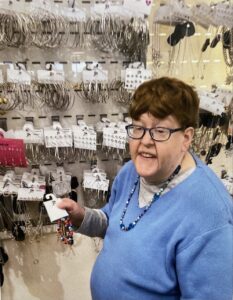
Creative endeavors were cited by multiple participants. Mark, who is currently unemployed but has experience in retail & a hospital kitchen, had aspirations of going into fashion design. He wants to “learn how to create [his] own clothing line” (Harc Focus Group 2 23:33), and asked us many questions about Trinity College, perhaps as a prospective student. Another participant, Olivia, who worked at the same insurance company as Jeff for just as long, creates jewelry at Harc and wants to continue exploring that career path. Harc has been in talks with a local jewelry store in an effort to land her this “dream job” (Harc Focus Group 2 27:01), and Mark has plans to create t-shirts for an LGBT group for fellow Harc members that he founded. Even if they currently do not have jobs in this space, they have found ways to express their creativity.
Near the end of our second Photovoice meeting, we went around the room asking everyone about their dream jobs. After recording their answers, one of our researchers remarked, “All you guys… just really want to help people?” (Harc Focus Group 2 57:56). To this, we received a chorus of yes’s. In all of these diverse areas, whether it be in public service, the medical field, retail, artistic endeavors, and more, the dream, above all else, was to be supportive to others. They want to give back to others in the ways they have been supported. Whether dealing with layoffs due to the pandemic, discrimination, or transportation issues, they still want to be productive members of society. They are the embodiment of why we should not judge what we see on the surface. In a world where money is the driving force behind many of our career decisions, someone’s main goal in their job simply being to be good is a refreshing and poignant outcome.